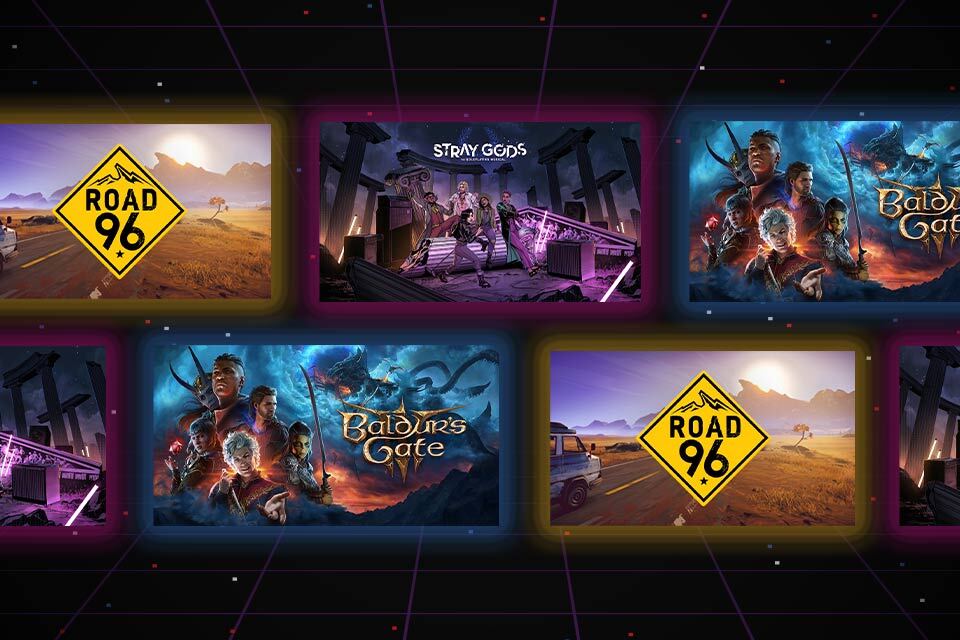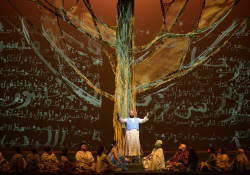Interactive Storytelling in Three Recent Video Games
 As technology develops. it causes changes in the mediums that house our literature, but our human ability to tell stories stays the same. In addition to novels, video games are a powerful digital medium for narrative exploration. Whether the story is being told through the written word, visually, or even orally, stories have the power to captivate the audience and allow us to get lost in the narrative being told. However, video games have the unique ability to make the stories we tell interactive. They enable players to engage with narratives and shape the outcomes through their choices. There is no shortage of games in the last five years that have done this. The three games listed below are some outstanding stories that have been published in the last couple of years in which players are able to get lost in discovering all the different ways they can change the outcome of the story.
As technology develops. it causes changes in the mediums that house our literature, but our human ability to tell stories stays the same. In addition to novels, video games are a powerful digital medium for narrative exploration. Whether the story is being told through the written word, visually, or even orally, stories have the power to captivate the audience and allow us to get lost in the narrative being told. However, video games have the unique ability to make the stories we tell interactive. They enable players to engage with narratives and shape the outcomes through their choices. There is no shortage of games in the last five years that have done this. The three games listed below are some outstanding stories that have been published in the last couple of years in which players are able to get lost in discovering all the different ways they can change the outcome of the story.
Road 96
ESRB: T (Teen)
French developer and publisher DigixArt
Released in 2021, in this roughly seven-hour-long indie game, you play as several teens making their journey out of the country of Petria. Throughout their trip to the border, the teens can encounter several characters: Franny, John, Jarod, Alex, Zoe, Soyna, or Stan and Mitch. They all have their own stories that interact with one another in some ways. Still, the dialogue choices the player is given will affect the character’s stance on things and, subsequently, the game’s ending.
Three conversation paths coincide with the endings: Revolution, Election, and Ignore. In the Revolution path, teens will take a stance that at times will read as “something needs to change in Petria and the election will not help.” This route encourages harsh actions to enact change. Teens taking the Election route take the stance of avid voters and believe that the election is the best way to change Petria. This route is more peaceful and favors diplomatic and nonviolent solutions. The final ending, Ignore, centers on the idea that the teen is simply trying to get out of the country and doesn’t care about changing Petria’s problems.
Outside the conversations, things in the world around the teen will affect the general ending. The player will have the chance to help teen nonplayer characters (NPCs) trying to leave the country too, steal money sitting about, break into buildings or safes, ask for money, call people using the pay phones, and tear down or vandalize election posters. Among the even more minor impacts, players will need to manage their teen’s stamina while deciding if they want to walk along the road, hitchhike, take the bus, or, if they find specific items, take a car. These will affect who and how often the teen encounters the other characters. These decisions, while small, eventually stack up, and you see the effects each time you start a new teen.
Beyond the three paths, there are also significant decisions to make regarding the characters you meet. This will usually be marked by a brief stop where the player must quickly make a tough decision. These huge decisions have such heavy impacts on the story that you could quickly spiral toward a different ending entirely.
Road 96 is a fantastic indie game with several choices for adjusting small details in the endings.
* * *
Stray Gods: The Roleplaying Musical
ESRB: T (Teen)
Australian developer Summerfall Studios and American publisher Humble Games
This roughly six-hour-long roleplaying musical game was released in August 2023. Players will play as Grace, who gets caught up in the murder of a Greek god and soon finds herself thrust into a world she didn’t know existed. Throughout Grace’s investigation into the murder, she will interact with figures from Greek mythology, such as Aphrodite, Hecate, Pan, and Medusa, to name a few. All are voiced by actors who have certainly earned their stripes: Troy Baker, Laura Bailey, Kimberly Brooks, Abubakar Salim, and Felicia Day are just some of this phenomenal cast.
True to its name, Stray Gods is a musical with many of the choices being made while Grace and the others are, well, singing. Players will have three personality traits that many conversation choices will fit into. These are Charming, Kickass, or Clever. In the first song of the game, players will need to decide which trait is primary. The trait chosen will allow players to select associated options in nonsong conversations. However, the one you pick will lock you out of the other two trait-related choices until you pick up your second trait late in the game. The trait you choose will impact Grace’s investigation and, subsequently, certain gods’ attitudes toward Grace.
While the trait you choose will affect what dialogue choices are available during conversations, it does not lock you out of choices during songs. The options during songs are colored after the three traits, and the path you choose during songs will change what is sung and what information the player finds out from the gods during them. Of course, both the songs and the conversations affect one of the three endings in the game. While the general story is not affected, not helping one god or not having access to a particular dialogue choice can and will affect the information Grace finds out, which will affect who helps Grace in the final number.
Stray Gods is a delightful roleplaying game with a fantastic cast and incredibly catchy songs that can change with small dialogue choices.
* * *
Baldur’s Gate 3
ESRB: M (Mature)
Belgian developer and publisher Larian Studios
Released in August 2023, this Game of the Year winner is a roleplaying adventure game that takes roughly sixty-four hours to complete. While much of the game is semi-open world exploration and turn-based combat, this doesn’t stop Baldur’s Gate 3 from weaving in interactive storytelling elements.
From the moment players enter character creation, they affect small details in the story. In character creation, players will have the choice of eight origins. This could be one of the six companions: Lae’zel, Shadowheart, Astarion, Gale, Wyll, or Karlach, the Custom origin, or the Dark Urge origin. The Custom origin is the base origin and will not give the player the small details they might get from the companion or Dark Urge origins. However, they can still affect minor aspects of the story. Choosing one of the companions or the Dark Urge will give players small story details they otherwise wouldn’t see. Some of these origins will change how the NPCs and even the main villains react to the main character.
Because this is a Dungeons and Dragons–based game, the race, class, and background players choose can open additional dialogue options for them. Dialogue also changes based on who starts the conversation with the NPC. Should players be controlling one of their companions when they trigger a conversation, that companion is the one talking, and their class, race, and background will be the additional dialogue options that are sometimes available.
The way the player interacts with the story goes beyond their origin and dialogue choices. In combat, deciding to use nonlethal or lethal attacks will later affect how certain people interact with the main character. In specific cases, choosing to use lethal or nonlethal can affect what companions the player picks up or keeps in the party. If the player accidentally or purposely kills certain NPCs, Larian has them covered. Some NPCs have backups created entirely in case the player kills certain people. At the same time, this isn’t the case for many NPCs; those with backups will briefly discuss what happened to the person they are replacing.
In addition to all the decisions already listed, players will also need to be careful of their companions’ approval ratings. While staying on your companions’ good side can be fairly easy, it’s just as easy to upset them. If their approval gets too low, they will leave the party, which will cause players to miss out on specific story details, some of which are semicrucial to the main story.
There are technically four endings to Baldur’s Gate 3, but that’s a loose four as many of the player’s decisions throughout the game can affect specific details in the end. The good ending, generally speaking, is the standard: “we did it.” We defeated evil, but as stated, minor changes occur depending on one’s choices with the semimentor figure, NPCs, and companions. The bad ending is generally “we became the evil,” which again has small changes depending on your choices with the other characters. The third ending depends entirely on whether you are playing as the Dark Urge. Little more can be said about the Dark Urge ending to avoid spoilers. The entirety of the Dark Urge origin changes some crucial elements of the game without changing the general story. The fourth ending can happen in two different situations and is entirely related to whether the player is playing as Gale or has Gale in the party. Again, to avoid spoilers, little can be said about this.
Baldur’s Gate 3 is a wonderful game, and the small details Larian put into it in terms of interactive storytelling make it that much better.
University of Oklahoma









